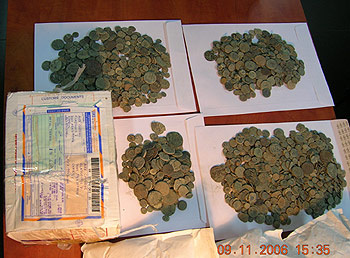
Part of the 5,000 Ancient Coins seizured by the Unit for the Prevention of Antiquities Robbery
IAA inspectors have foiled four attempts at smuggling antiquities that included more than 5,000 ancient coins from Israel abroad. The seizure of the coins was made possible thanks to intelligence information that reached the Israel Antiquities Authority and assistance provided by the Postal Authority. In an examination conducted by personnel from the Unit for the Prevention of Antiquities Robbery it became apparent that the contraband coins are from the Hellenistic period (c. 2,300 years ago), the Second Temple period, the Roman, Byzantine and Mamluk periods. Among the items are rare and important coins from the time of the Hasmonean dynasty and the period of the Great Revolt of the Jews against the Romans (66-70 CE). In a court ordered search carried out in the home of one of the suspects, dozens of ancient pottery vessels were seized which are also thought to have been stolen from ancient tombs.
Inspectors from the Unit for the Prevention of Antiquities Robbery opened an investigation which has revealed that two of the suspects are licensed antiquities dealers in Jerusalem. It also turns out that the suspects chose to send the ancient coins abroad without permission from the Israel Antiquities Authority even though they were fully aware of the legal requirements in this matter. The director of the Unit for the Prevention of Antiquities Robbery, Amir Ganor, said today that, “all that remains for us to do is to cry over the tremendous damage that was caused to the antiquities sites and the loss of historical and cultural information as a result of collecting such a large amount of coins in an illicit and unscientific manner”.
The Israel Antiquities Authority reports that in the coming days a charge sheet will be filed against the suspects for violations in the attempted export of antiquities from Israel without a permit, possession of property suspected of having been obtained illegally and the failure to maintain an inventory as required by law, offenses that carry a punishment of three years imprisonment.
The spokesperson for the Israel Antiquities Authority, Osnat Gaoz, wishes to remind the public that the law specifically states that an export license must be obtained prior to sending any ancient artifact abroad from the State of Israel.
Additional Articles ...